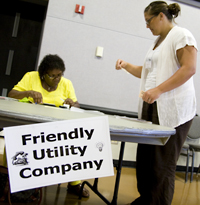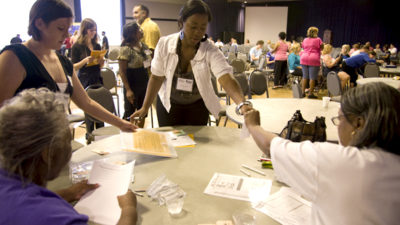School of Social Work celebrates 10 years of service
Just one day earlier, with hopes for a bright future, first-year Master of Social Work (MSW) student Evan Linville soaked up information at the UMKC College of Arts and Sciences‘ School of Social Work‘s orientation.
The next day, Linville stepped into the shoes of Franco – a 17-year-old whose father had abandoned his mother, leaving her with $10 in cash and an empty bank account. Desperate to regain a financial footing, Franco spent the day trying to pawn cameras and applying for minimum-wage jobs.

Rachael McGinnis-Millsap, a second-year MSW student, participates in the School of Social Work’s Poverty Simulation before the fall semester begins.
Like the School of Social Work did when it began 10 years ago, students hit the ground running through its 2010 Poverty Simulation. Grouped in “families” of three or more, each student received a packet detailing their “family’s” financial situation. Around the perimeter of Pierson Auditorium, United Services Community Action Agency (USCAA) volunteers staffed a fictional bank, quick cash center, community action agency, general employer, utilities department, childcare center, school, school bus, juvenile hall and pawn shop.
Once a whistle sounded – signaling the beginning of week one in a month of poverty – students rushed from table to table, trying to improve their situations in 20 minutes.
Don Baston, USCAA special projects coordinator, offered a few suggestions.
“There’s Big Dave’s Pawn Shop – you can take him a 15-carat solitaire and you’ll come out with 15 cents. He’ll always cut you a good deal,” Baston said. “There’s the community action agency. We provide case management, counseling referrals and Individual Development Accounts – you put in $1 and the federal government matches it with $2, so you can buy your first home, save for your kids’ tuition or start a business.”
Second-year MSW student Lakeshia Jackson ran to the employer’s office, childcare center, social services agency and utilities department. She was tasked with being an unemployed single parent who needed to pay $730 in bills, find childcare and avoid becoming homeless.
“Working in the field of social work, obviously you’re going to be dealing with underprivileged people,” Jackson said. “Doing this particular exercise now stimulates me to think about what my clients are going through, so that I can better understand the process and their frustrations.”
A community resource worth millions
When the fall semester begins, each full-time MSW student will not only attend classes but also provide at least 16 hours of community service each week. According to the Washington, D.C.-based Independent Sector, an hour of community service is worth about $18.70 in Missouri. With 152 MSW students providing about 520 hours of service this year, the School of Social Work will provide more than $1 million of service to Kansas City. This number does not include the School’s full-time faculty members, who serve on boards and provide pro-bono consulting services to community agencies.
“For us, service-learning is a no-brainer,” said Monica Nandan, chair of the School of Social Work. “Eighty to ninety percent of class assignments are based on real clients, which help students build skills they can use throughout their careers.”
Through service-learning and other exercises, such as the poverty simulation, students learn to tailor solutions to their clients. Rather than providing each client with the same solution, students address the systemic causes of each client’s problems.
One of Assistant Professor Patricia Scott’s students, for example, created an unconventional solution that a social services agency later adopted. At this agency, teenage girls who had been abused were required to tell their stories. Many could not share their stories, so the MSW student suggested they create slideshows to communicate their stories. The girls wrote their thoughts on poster boards and arranged them into a slideshow.
“It was very powerful,” Scott said.
Building upon a decade of success
In 2000, with the help of social work professionals and community leaders, the School of Social Work – a graduate-level-only program – welcomed its first class of students.
“There was a great need for a local in-the-city program that would devote its training focus to the social and health needs of the urban environment, as well as make a commitment to recruiting and training minority social workers at the master’s level,” said Professor Lee Rathbone-McCuan. “There was a critical shortage of such personnel.”
Fully accredited by the Council on Social Work Education, the UMKC MSW Program has maintained strong relationships with area health and social service agencies, creating internship agreements with more than 500 organizations. Students can enroll full-time, or work and take courses on the weekend. To learn more about the UMKC School of Social Work, visit http://cas.umkc.edu/socialwork/prospective-students.asp.

